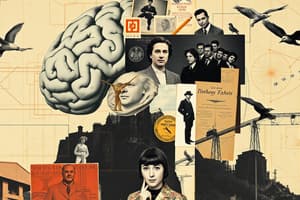Podcast
Questions and Answers
What does the term 'negative symptoms' typically refer to in psychological contexts?
What does the term 'negative symptoms' typically refer to in psychological contexts?
- Excessive interpersonal engagement
- Heightened sensory awareness
- Absence or lack of normal emotional responses (correct)
- Increased emotional responses
Which technique is NOT associated with psychodynamic therapy?
Which technique is NOT associated with psychodynamic therapy?
- Transference
- Cognitive reframing (correct)
- Free association
- Dream analysis
In behavior therapy, which process is best described by gradually exposing a client to a feared stimulus while teaching coping strategies?
In behavior therapy, which process is best described by gradually exposing a client to a feared stimulus while teaching coping strategies?
- Cognitive restructuring
- Token economy
- Aversion therapy
- Systematic desensitization (correct)
Which of the following is considered a biomedical therapy?
Which of the following is considered a biomedical therapy?
What distinguishes couples therapy from family therapy?
What distinguishes couples therapy from family therapy?
What are the three most important parts of the definition of psychology?
What are the three most important parts of the definition of psychology?
Which perspective in psychology emphasizes the role of unconscious processes?
Which perspective in psychology emphasizes the role of unconscious processes?
Which of the following traits is NOT part of the Big Five traits in the Five-Factor model?
Which of the following traits is NOT part of the Big Five traits in the Five-Factor model?
What is the primary focus of Freud's psychodynamic perspective?
What is the primary focus of Freud's psychodynamic perspective?
Which of the following is a criterion for labeling behavior as abnormal?
Which of the following is a criterion for labeling behavior as abnormal?
What is a significant difference between Bipolar I and Bipolar II disorders?
What is a significant difference between Bipolar I and Bipolar II disorders?
What type of personality assessment uses ambiguous stimuli to elicit responses?
What type of personality assessment uses ambiguous stimuli to elicit responses?
Which model primarily views psychological disorders through the lens of biological and physical explanations?
Which model primarily views psychological disorders through the lens of biological and physical explanations?
Flashcards
Dissociative Identity Disorder
Dissociative Identity Disorder
A dissociative disorder where a person displays multiple distinct personalities or identities.
Insight therapies
Insight therapies
Types of therapy that focus on helping patients gain insight into their thoughts, feelings, and behaviors.
Systematic Desensitization
Systematic Desensitization
A behavior therapy technique that uses classical conditioning to reduce anxiety by gradually exposing the person to feared stimuli.
Token Economy
Token Economy
Signup and view all the flashcards
Psychodynamic Therapy
Psychodynamic Therapy
Signup and view all the flashcards
Psychology Definition
Psychology Definition
Signup and view all the flashcards
Freud's Psychoanalytic Theory
Freud's Psychoanalytic Theory
Signup and view all the flashcards
Levels of Consciousness
Levels of Consciousness
Signup and view all the flashcards
Big Five Traits
Big Five Traits
Signup and view all the flashcards
Abnormal Behavior
Abnormal Behavior
Signup and view all the flashcards
Major Depressive Disorder
Major Depressive Disorder
Signup and view all the flashcards
Projective Tests
Projective Tests
Signup and view all the flashcards
DSM
DSM
Signup and view all the flashcards
Study Notes
PSY 2012 - General Psychology - Exam 4 Study Guide
-
Chapter 1: Introduction to Psychology
- Definition of psychology, including its 3 most important parts
- 4 goals of psychology
- Historical perspectives: Wundt's structuralism vs. James' functionalism
- Different psychological perspectives (psychoanalytic, behavioral, humanistic, cognitive, biological, biopsychosocial) and their key ideas.
-
Chapter 12: Personality
- Definition of personality
- Psychodynamic perspective, including Freud's psychoanalytic theory
- Levels of consciousness (conscious, preconscious, unconscious)
- Structure of personality (id, ego, superego)
- Psychosexual stages of development
- Key tenets of humanistic perspective (Maslow's hierarchy of needs, Rogers' unconditional positive regard)
- Trait theories, including the Big Five traits (OCEAN)
- Personality assessment methods (projective tests like Rorschach, TAT and objective tests like MMPI, 16PF, Myers-Briggs Type Indicator)
-
Chapter 15: Psychological Disorders
- Criteria for determining abnormal behavior
- Classification of disorders using the DSM (Specify the publisher and current edition)
- Models of psychological disorder etiology
-
Chapter 16: Treatment of Psychological Disorders
- Review of Infographic 16.1
- Theoretical perspectives on treatment (insight therapies: psychodynamic)
- Techniques within psychodynamic therapies (dream analysis, interpretation, free association, resistance, transference)
- Humanistic therapies
- Behavioral therapies (Classical conditioning techniques, systematic desensitization, aversion therapy, behavior modification using rewards/punishment, token economy).
- Cognitive/cognitive-behavioral therapies – know the core principles
- Biomedical therapies, including drug therapy and ECT
- Group therapies (self-help, family, couples)
- Different models of treatment (Medical, psychological and sociocultural) - Common features and disorders in each category.
Studying That Suits You
Use AI to generate personalized quizzes and flashcards to suit your learning preferences.
Related Documents
Description
Prepare for Exam 4 in PSY 2012 with this comprehensive study guide. Explore key concepts from Chapters 1 and 12, including foundational definitions, psychological perspectives, and theories of personality. Understand the major psychological frameworks and tools for personality assessment.




